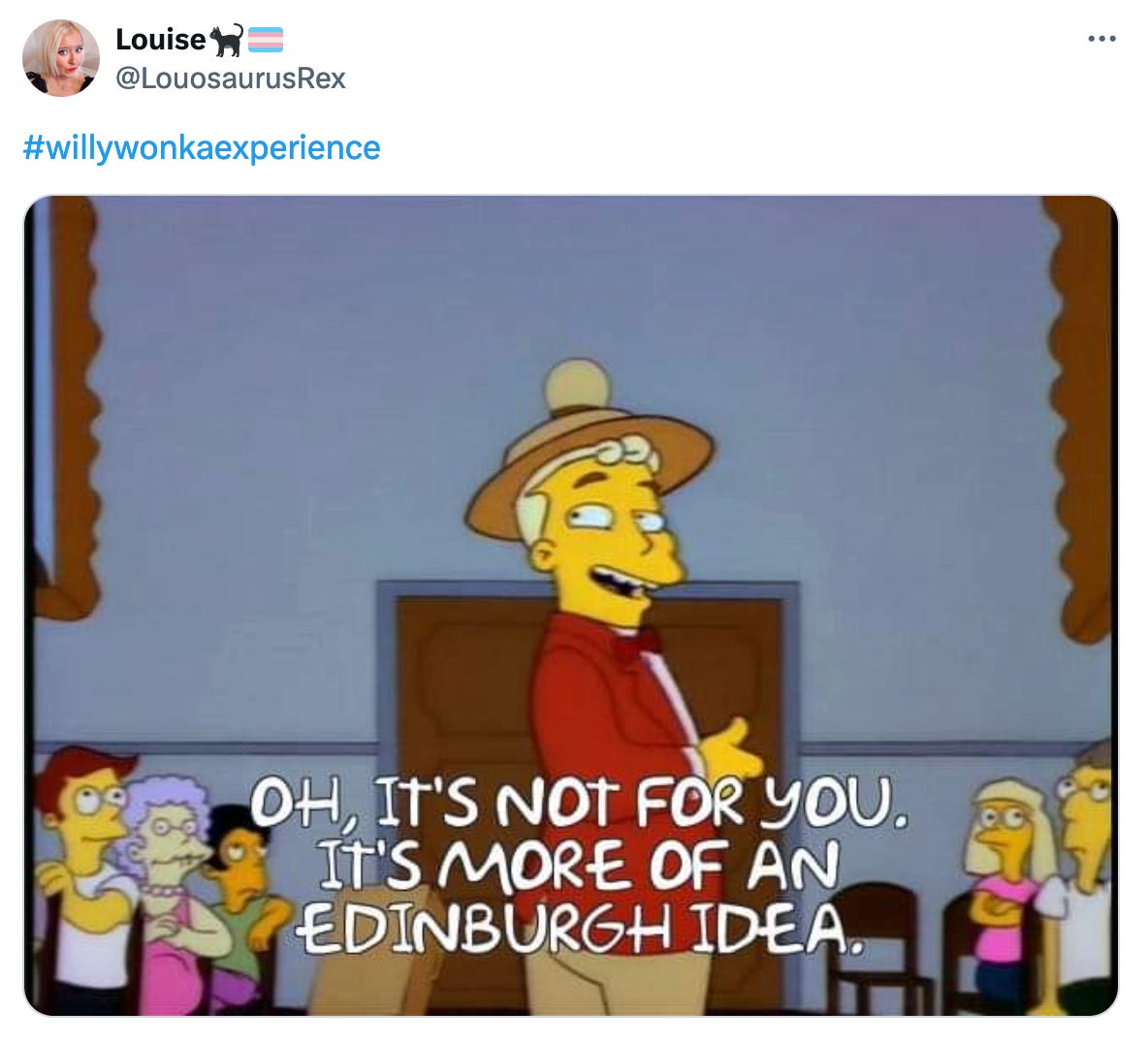Willy Wonka and weird-ass AI
How an experience in Glasgow shows the shape of business to come
One story ruled the internet this week: Glasgow’s Willy Wonka experience.
For those not in the know, this was a children’s event in the Scottish city that was marketed like this:
And this:
Yet when people showed up, they were met with, well, this:
And things get increasingly delicious the more you see:
And my personal favourite? The poor, poor person dressed as an Oompa Loompa behind what can only be described as a Fisher Price meth lab:
If you’d like an even closer look at the event of the century, this video is a wonderful insight into the mundane chaos on show.
Before we dig into what the Wonka Experience means, let’s get something out of the way: the story is unequivocally hilarious.
Children were so upset the police were called. People demanded refunds. And the memes? My god, they’ve been endlessly delicious.
On the surface, the Glasgow Willy Wonka Experience is an old-school scam. You say, “this thing is gonna be great,” it’s an appalling disappointment, and you run away into the sunset with pocketfuls of cash.
But the reality is different. What happened in Glasgow is far more modern — and may just be a signifier of the future.
So, what makes the Willy Wonka Experience different? That’s just how much it relied on AI-generated content to draw people in.
We’ve already seen the photos at the top of this piece, but take this picture teasing the event as another example:
It wasn’t just the Willy Wonka Experience itself that uses the tech.
The company behind the event — known as the The House of Illuminati — seems to created its entire business using artificial intelligence:
And, yep, it’s not just images. It’s pretty damn clear all the copy was written by a robot too:
Interestingly, it looks like there’s a single fella behind the The House of Illuminati and the Willy Wonka Experience. And yes, he’ss already been tracked down and interviewed.
His name? Billy Coull.
And, in many ways, he’s the epitome of the dream tech bros sold about AI.
Think about it, what he did was pretty impressive. Using artificial intelligence Coull created marketing materials, wrote website text, and put together a huge part of the event all by himself.
Over a thousand people bought tickets at £35 a pop. This is it! AI in action! People doing more with less! Success!
The most common response to the Willy Wonka Experience’s use of AI has been a call for more regulation, that this is all a scam that will happen time and time again.
But… here’s the question. Did Coull, the fella behind it all, really want to scam people?
If so, there seem easier ways to grab cash from people. Like starting a crypto brand.
My guess? He’s a wannabe businessman. He really did want to put an event on. AI helped him get it all started, but, when reality hit, the whole thing came tumbling down.
This, in a strange way, might be the worst part of artificial intelligence.
Not deepfakes or robots taking our jobs, but the fact that it lowers the barrier of entry to an absurd level.
We’re conditioned to see something like the Willy Wonka Experience as the work of a team. There’s a website, marketing collateral, artwork — it all suggests multiple people working together. Wages being paid. Organisation.
AI smashes this conditioning to the ground.
But beyond that, if there was a proper team around Coull, maybe someone would’ve pointed out that his budget and goals were not comparable. Instead, he operated in a bubble until it was rudely popped by reality of a hilariously shit event.
I can’t help seeing echoes of social media in this.
The idea of giving every single person a platform sounds excellent on the surface, but now we’ve experienced it, it’s clear that not everyone deserves one. There are a lot of racists and dicks and fools out there.
Sometimes, every now and then, a barrier to entry is a good thing.
Think of it like an open mic night. Anyone can come up on stage and have a go, but if they do something particularly terrible, they won’t be allowed to return. There’s a sort of built in control there.
This is especially true for businesses. If you think some bad ideas have reached the public through the corporate world, the shit left on the cutting room floor will make your toes curl. The very worst is filtered out when you have to actually work with people.
In many ways, AI will remove this control.
And the outcome? We might just see a lot more Willy Wonka Experiences. Which, to be honest, I’m not that mad about.












